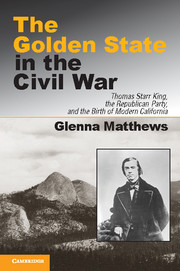 The Golden State in the Civil War
The Golden State in the Civil War Book contents
- Frontmatter
- Contents
- Preface and Acknowledgments
- Introduction
- 1 The Golden State in the 1850s
- 2 Thomas Starr King and the Massachusetts Background for His California Activism
- 3 Toward a Political Realignment
- 4 The First Years of War
- 5 The Military Front
- 6 The Cultural Front
- 7 A New Role for California Gold and a Seesaw Federal–State Relationship
- 8 “Coppery” California
- 9 Californians of Color
- 10 A Tragic Death and Its Aftermath
- Epilogue
- Index
- References
2 - Thomas Starr King and the Massachusetts Background for His California Activism
Published online by Cambridge University Press: 05 April 2012
- Frontmatter
- Contents
- Preface and Acknowledgments
- Introduction
- 1 The Golden State in the 1850s
- 2 Thomas Starr King and the Massachusetts Background for His California Activism
- 3 Toward a Political Realignment
- 4 The First Years of War
- 5 The Military Front
- 6 The Cultural Front
- 7 A New Role for California Gold and a Seesaw Federal–State Relationship
- 8 “Coppery” California
- 9 Californians of Color
- 10 A Tragic Death and Its Aftermath
- Epilogue
- Index
- References
Summary
ORIGINS
On July 4, 1821, a young shoemaker named Thomas Farrington King gave a patriotic address to a group of his fellow workers in New York City, the combined “Tammany, Hibernian, Stone Cutters’, Tailors’, and Cordwainers Societies.” In ornate language he denounced ecclesiastical despotism and called out the glorious names of the Revolutionary heroes. This speech, as it happened, would change his life and make possible the career of his firstborn child, Thomas Starr King, who would go on to consort with men and women at the pinnacle of American cultural life first as a Universalist and then as a Unitarian clergyman.
The usual pattern for the New York tradesmen when inviting an orator for an important occasion was to turn to a clergyman or local politician. But the elder King had gained a reputation for eloquence, and hence he became the choice of his fellow workers. Making full use of this unusual opportunity, he displayed his learning with references to the poet Cowper and the British statesman Chatham, among others. The speech so impressed the tradesmen that they convinced him to put down the tools of his craft to go into the ministry.
- Type
- Chapter
- Information
- The Golden State in the Civil WarThomas Starr King, the Republican Party, and the Birth of Modern California, pp. 42 - 63Publisher: Cambridge University PressPrint publication year: 2012
